Sep 2, 2023
The heart itself is but a small vessel, yet there are dragons and there are lions; there are poisonous beasts and all the treasures of evil. And there are rough and uneven roads; there are precipices. But there is also God, also the angels, the life and the kingdom, the light and the apostles, the treasures of grace—there are all things. – Pseudo-Macarius, 5th Century
By Brother Matt Schaefer, C.PP.S.
Some years ago, I was going through some spiritual struggles. I had recently completed my formation with the Missionaries of the Precious Blood, and I was trying to figure out how I would live in the world as a Missionary brother. I’d made a commitment to God and to my fellow Missionaries; but how did God want me to live out that commitment? What was I supposed to do about the internal struggle between selfish desires and selfless service? Between my own will and God’s will?
Fortunately, I had a very good spiritual director who helped me sort out my thoughts. She gave me a reading that included the above quote from an unknown homilist. The author offers a wonderful picture of the contradictions residing in the human heart: the capacity to do wrong or do right, the presence of both darkness and the light of God, treacherous beasts and guiding angels. With all that going on, it is no wonder that discerning the will of God can be challenging.
In today’s Gospel, Jesus has a hard lesson for the disciples about God’s will, both for Jesus and for them. Jesus tells them that he will suffer, be killed, and be raised. Peter cannot accept this. The Messiah was expected to be a victorious warrior who would conquer their enemies and lead an earthly kingdom for God’s chosen people. Such a Messiah could not suffer and die. Perhaps Peter was hoping that the loyal disciples would also be spared suffering. Jesus rebukes Peter, “Get behind me, Satan.” This seems harsh, but it highlights the ever-present temptations that interfere with our discernment of God’s will. And Jesus doesn’t say, “Go away, Satan!” No, he instructs Peter to get behind him—in other words, to follow him.
Jesus then instructs his disciples to deny themselves, take up their crosses, and follow him. Denying oneself is not about putting yourself down or erasing your unique identity; it is about respecting yourself as a child of God. To follow Jesus fully, we must avoid selfish desires and worldly temptations so that our lives will be ordered to the will of God. Taking up our crosses isn’t just about accepting the trials and annoyances of life; it means embracing everything that comes with a life devoted to Jesus. Remember that the cross was not just a means of death; it was a shameful and horrific punishment. But we know also the glorious message of the cross—that it is the source of our redemption. Those who are willing to pay the price will be vindicated.
Poor Peter’s heart, like my own, surely had its beasts, temptations, and rocky roads; but in the end he listened to the good things that resided there. He let the angels and the grace of God guide him in his journey to follow Jesus. The will of God is discerned through Scripture, through the teachings and sacraments of the Church, and through prayer. Indeed, the will of God is already present in our hearts; we just have to find it amidst all the distractions. Taking Peter and the disciples as models, may we always be committed to discerning God’s will and following him with joyful, undivided hearts.

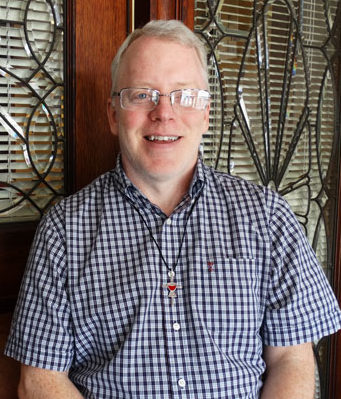
Brother Matthew Schaefer, C.PP.S., is in ministry at the St. Gaspar Family of Parishes in Dayton.
Aug 28, 2023
Fr. James McCabe, C.PP.S.
December 6, 1931–August 27, 2023
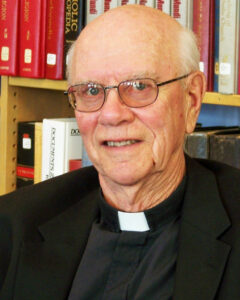 Fr. James McCabe, C.PP.S., 91, died peacefully in his sleep on Sunday morning, August 27, in the infirmary of St. Charles Center, Carthagena, Ohio. He had been in failing health.
Fr. James McCabe, C.PP.S., 91, died peacefully in his sleep on Sunday morning, August 27, in the infirmary of St. Charles Center, Carthagena, Ohio. He had been in failing health.
Fr. McCabe was born in Newcastle, Neb., on December 6, 1931, to Lawrence and Helen (Lewis) McCabe. The family moved to Detroit in 1941, and he considered Detroit his second hometown.
He entered the Congregation in 1945 at Brunnerdale, its former high school seminary near Canton, Ohio, and was ordained on June 1, 1958.
In his years as a priest, he was involved in parish ministry, college administration and leadership of the Congregation.
Fr. McCabe served briefly in parishes after his ordination, then became an instructor and librarian at St. Charles Seminary in Carthagena, Ohio, from 1961–65. During that time, he also served as archivist for the Congregation. In 1965, he became the librarian of Saint Joseph’s College in Rensselaer, Ind., which is sponsored by the Missionaries of the Precious Blood. He earned a master’s degree in library science from Catholic University, Washington DC.
He was instrumental in the growth of another college sponsored by the Missionaries, Calumet College of St. Joseph in Hammond, Ind., where he served first as executive vice president beginning in 1972, then president from 1975–80.
Fr. McCabe returned to parish work in 1982, when he was named pastor of St. Mary of the Woods Church in McQuady, Ky. He became pastor of Immaculate Conception Church in Hawesville, Ky., in 1983.
In 1987, Fr. McCabe was named pastor of Immaculate Conception Church in Celina, Ohio, where he served until 1992, when he was appointed provincial secretary for the Cincinnati Province. He also served the province as its personnel director and had been a member of its senate.
In 1997, Fr. McCabe accepted an assignment to the Sorrowful Mother Shrine in Bellevue, Ohio. He was named director of the shrine in 2000, where he served until his retirement in 2001. He moved to St. Charles Center in 2002.
Fr. McCabe had a genial manner and in parish life, generally led by consensus. He was a good listener and effective preacher, often including his own foibles that drew smiles from listeners. Yet he had a powerful intellect and organizational skills. His nickname in the Congregation, given to him while still at Brunnerdale, was Dux, Latin for “leader.”
He had a lifelong love of books—he learned the trade of bookbinding while a student at St. Charles and pursued it as a hobby later in life. He also loved fishing and birdwatching and was an avowed, if mostly ineffectual, enemy of the squirrels that raided his birdfeeders.
Devoted to his family and the Community, Fr. McCabe knew how to make connections with others, and keep them connected. In the 1990s, Fr. McCabe helped found the Amici, a group of former members and students of the C.PP.S., to establish or re-establish connections with those who had been educated and formed by the Missionaries. For many, it was an important act of reconciliation in keeping with Precious Blood spirituality. He served as Amici coordinator from 1987 to 2005.
Fr. McCabe was the last surviving member of his immediate family. He was preceded in death by his brother, Patrick, and his sister, Shirley Lyle.
He is survived by numerous nieces and nephews, great-nieces and great-nephews.
A Mass of Christian Burial was celebrated at St. Charles Center on Thursday, August 31, at 2 p.m., Fr. Jeffrey Kirch, C.PP.S., provincial director, presiding. Fr. Ken Pleiman, C.PP.S., was the homilist. Burial followed in the Community cemetery.
Memorial contributions may be made to the Missionaries of the Precious Blood United States Province.
Aug 26, 2023
By Fr. Tim McFarland, C.PP.S.
Many times, we hear people having an identity crisis or perhaps we have experienced that in our lives. Today’s Gospel introduces us to ways in which people were discovering and growing in their understanding of Jesus. This can also speak to the ways in which we grow in our understanding of who Jesus is for us. Throughout our lives our image of Jesus changes in response to our situation. Old images of Jesus pass and new ones come to be.
Each of us needs to give a personal answer to Jesus’ question: “Who do you say that I am?” Peter’s response is a solid basis from which to begin. Notice that the phrase “Son of the Living God” expresses more richly what “Christ” means. Peter’s faith comes to him as gift from above, not from any mere logic or ingenuity. Why was the blessing given to him in particular? Perhaps because his humble and contrite spirit made him best prepared to receive it? Or because God chooses whom he wills, irrespective of their merits? Jesus entrusts to Peter whatever is meant by the keys of the Kingdom of Heaven. Upon his solid, dedicated faith the Church will always rely, for unity and encouragement.
This Sunday we are presented with two figures who are given keys. The first is Eliakim. Eliakim was the secretary to Shebna, the Master of King Hezekiah’s palace, back in the 8th century before Christ. According to the first reading from Isaiah, Shebna lost favor with the Lord and was replaced by Eliakim. Isaiah says that God placed the keys of the kingdom on Eliakim’s shoulder. He would be Master of the palace and the one through whom others would have to go to get access to the King.
The Gospel reading presents Peter as receiving the keys of the Kingdom of God. Like Eliakim, he would determine who has access to the King. Peter is usually pictured as carrying large keys, representing the authority given to him by the Lord. It is interesting that Peter, whom we know had his weaknesses, receives the keys to the Kingdom. This should give us hope that despite our weaknesses and failures, we too are called to proclaim the Kingdom in word and action.
In these passages, keys are interpreted as signs of authority and that is the foundation for our belief in the authority of the pope, Peter’s successor. I suggest that we might look at the key in a different way. A key can also be seen as a guide, like an answer key to an exam. Our faith in Jesus gives us a key to better understand our lives. We can use the “key” of our Precious Blood spirituality. Our spirituality can give us a key to cope with suffering in our lives, to reconcile differences among people, and to form communities. The scriptures today pose a question, similar to the question posed by Jesus: how does our faith, our spirituality, serve as a key to our lives?
To view the full scripture reading, click here.

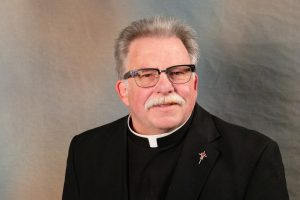
Fr. Tim McFarland, C.PP.S., is the director of ministry and mission and serves on the faculty at Calumet College of St. Joseph in Whiting, Ind.
Aug 19, 2023
By Vicky Otto
The older I get, the more I admire the women we read about in the Gospels. Each, in their way, has taught me essential life lessons. Mary taught me the importance of saying yes to God. The women who stood at the crucifix demonstrated the importance of fidelity to relationships. And Mary Magdalene taught me about bravery, courage and speaking truth to power.
This weekend, I add the voice of the Canaanite woman in the Gospel that we hear proclaimed this week. A friend this week told me that when she read a reflection about her, the chapter was called “The Uppity Woman.” I have learned a lot from uppity women; this Sunday, the lesson is about tenacity, persistence and faith, even when faced with one obstacle after another.
This week’s Gospel can be challenging to proclaim, preach about, and listen to because the comments Jesus makes can be perceived as harsh and insensitive. It is important to note that Jesus’s words and actions to the Canaanite woman made sense for his time and culture. It does not make them right, yet it is the world in which Jesus and the woman meet.
This meeting of the two is the first lesson the woman offers; she shows up. She shows up knowing she is not welcomed or wanted; she is an outsider on the fringes of society. She does so because she wants to save her daughter. Nothing would keep her from reaching out to Jesus, even when the world seems to set up everything against her.
As the woman and Jesus conversed, the woman offered the next lesson, persistence. We don’t know why Jesus acted the way he did. Yet every time he tries to push her away, she returns, respectfully yet persistently. Her faith led her to believe there was enough for everyone, even the dogs. She wasn’t begging for a feast; she was begging for a crumb, knowing that crumb would save her daughter.
As she banters back and forth with Jesus, a writer noted that she was helping him learn about his vocation. Jesus was impressed with her vision and inspired by her tenacity. While he told the disciples that he was sent only to the lost sheep of the house of Israel, he now can embrace a vision of a table stretched to include a far more diverse group of diners.
I would like to believe that we each have the tenacity and persistence to reach out in faith the same way the Canaanite woman did. She is a true testament to our spirituality that God’s love knows no boundaries, and there is enough for everyone.
To view the full scripture reading, click here.

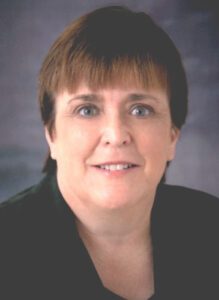
Vicky Otto is the executive director of the Precious Blood Spirituality Institute. She is also a Companion of the Missionaries of the Precious Blood.
Aug 15, 2023
A message on the anniversary of C.PP.S. founding from our
Provincial Director Fr. Jeffrey Kirch, C.PP.S.
As we mark another year of life in our Congregation—208 years now since our founding in 1815 by St. Gaspar del Bufalo—my thoughts turn to his thoughts in those early days. How did he envision the future? How did he attract people to the new Congregation and its mission of renewing the Church and the world through the power of the Precious Blood?
Missionaries have been faithful to that mission ever since, with God’s help. We might even say that renewal and reconciliation are just as important today than in Gaspar’s day. We never have to worry about running out of work.
And the Precious Blood family does not run out of energy. Not our Missionaries, not the sisters’ congregations that are also under the banner of the Precious Blood, not our lay associates or those who faithfully support our work.
It is heartening to me to see the many ways that Missionaries carry out their ministry, and the mission of our Congregation. As provincial director, I am privileged to sit with members as they talk about their dreams, plans and preferences. As we talk, we are working together for the good of the Congregation, the good of the Church, and the good of the member. I believe that all of that can be aligned, with God’s guiding hand.
I like the way our Fr. Ben Berinti, C.PP.S., described life as a Missionary of the Precious Blood in a recent article in the Florida Catholic. Fr. Ben spoke of “the joy of being set down smack dab in the middle of daily life with real people trying to find ways to answer the call of Christ to the fullness of life he offers.
“The blood of Christ is all about LIFE…there is life in the Blood. And so, as a Missionary of the Precious Blood, I am called to lift up life and the saving work of Christ rather than to judge, criticize, offer a negative outlook, lament how terrible the world is, etc. I am called to be a positive force for life and growth, to be a person of hope and encouragement.”
Let us all be people of hope and encouragement. Let us all find life in the Precious Blood of Jesus.
Aug 12, 2023
By Fr. Tony Fortman, C.PP.S.
Today, we see Jesus walking on the water, a miracle indeed. This is a violation of a natural occurrence. Peter also walks on the water until he takes his eyes off Jesus.
I can remember my first swimming lesson at Spring Lake in Pandora, Ohio. I actually got thrown into the water. I then did my best to dog paddle back to the cement wall. Some may say that this is a crude way to teach someone swim. It might have been, but it was effective.
Each day, you and I are thrown into this arena called life. We may have some expertise in daily experiences. But there are times when we are out of our element. We don’t know which way to turn. Peter was willing to step out of the boat. He was willing to take a chance.
I commend Peter in his belief and action. I admit that sometimes I don’t want to leave the boat and its security. Peter denies Jesus three times but he was willing to follow him. He was willing to speak when others would remain silent. That has to catch your attention. Many times Peter was not in control of the future but he was willing to speak up. Yes, he put his foot in his mouth many times. He did not follow through on what he said. Remember when Peter said that he would even die for Christ? But he denied him right away. Peter did die for Jesus but it took a while for him to have the courage to stand for Christ.
In some of my conversations with people, I see I don’t always want to speak up to reveal myself in speech, and maybe they don’t either. I want to play it safe. I want people to appreciate me. I don’t want to be seen as being wrong. I want to have a perfect record in the eyes of others. But when I am not willing to take a chance and speak up or risk being wrong in the eyes of others, then I actually die.
I don’t have to impress others. I just have to be willing to be a disciple of Christ. I don’t need other people’s approval. In fact, many people will disagree with what I say. God wants me to give my best to others now. God is asking all of us to get out of the boat. Stop playing it safe and stop being a perfectionist. Stop judging others from your safe perch. God and others need you to be you. You will make mistakes. There will be people waiting to laugh at you and say that you’re wrong. Don’t look for consolation from others but look to Christ’s affirmation. Keep your eyes on Jesus. God bless you all.

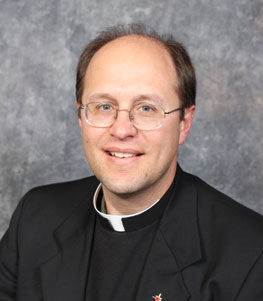
Fr. Tony Fortman, C.PP.S., is the pastor of the St. Gaspar Family of Parishes in Dayton.
Aug 7, 2023
It’s been a reflective summer so far for Newton Lih, who is now in special formation with the Missionaries of the Precious Blood.
For much of June and July, Newton has been living with the Missionaries at the Precious Blood Center in Liberty, Mo. He attends morning Mass then spends time with Fr. Keith Branson, C.PP.S. They discuss the history of the Congregation, and more. Together they are reading a book by Fr. Joe Nassal, C.PP.S., “Passionate Pilgrims.”
“That gives us the opportunity to reflect on Precious Blood spirituality in very open conversations,” Newton said. “For Fr. Keith and I, conversation flows like a river—it meanders, takes twists and turns, comes from a lot of different perspectives, brings in knowledge from different backgrounds. It’s a full conversation at a nice pace.”
The purpose of special formation is to help a candidate dive deeper into Precious Blood spirituality, Community life and its history. “It’s been really wonderful,” said Newton, who first moved into the Missionaries’ San Felice House of Formation in Chicago in the fall of 2021. Newton, who grew up in California, first became acquainted with the Community through Fr. Matt Link, C.PP.S., at Holy Redeemer Church in San Francisco.
Newton made his first commitment to the Community at the US Province’s assembly in June. In Liberty, he continues to be immersed in community life, sharing evening meals with C.PP.S. Frs. Ron Will, Mike Volkmer and Jim Betzen at the center.
“I’ve been spending a lot of time reflecting. I go back to my room with all sorts of experiences to process,” he said.
For instance, recently he made a weekend visit to St. Francis Xavier Church in St. Joe, Mo., where C.PP.S. Frs. Al Ebach and Lac Pham are in ministry. They had invited some diocesan priests over for dinner, and Newton joined them.
“I thought about how in Gaspar’s day, he forged partnerships with the diocesan clergy. To think about how that happened in Gaspar’s day, then see how our Missionaries are doing the same thing, was interesting to see,” he said.
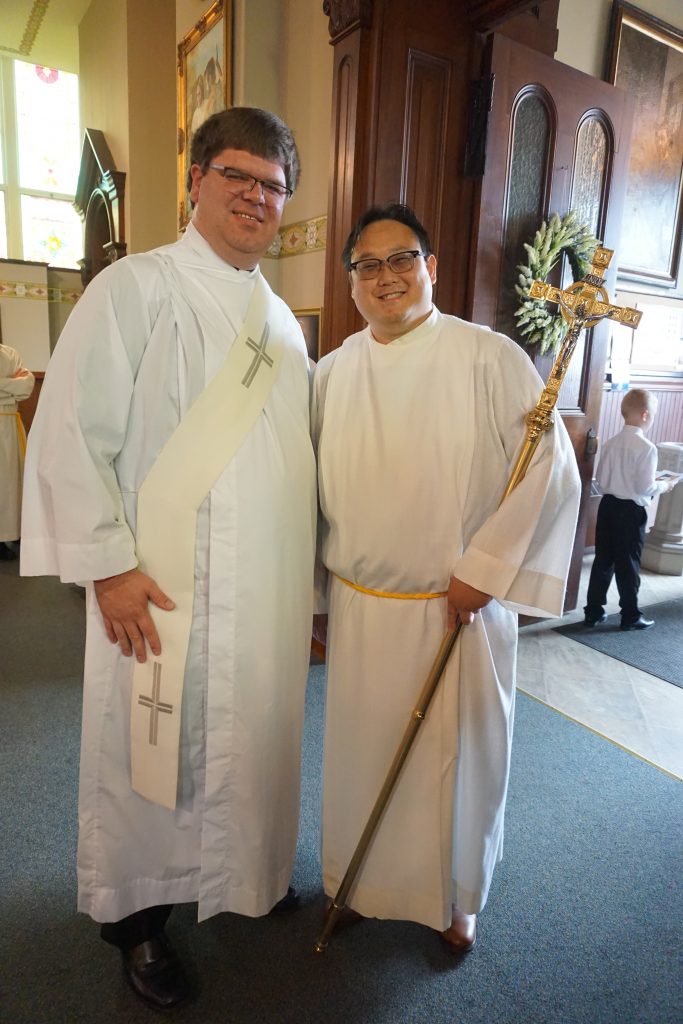 Soon, Newton will move on to the next location for his special formation year, St. James the Less Parish in Columbus, Ohio. There he will live with C.PP.S. Frs. Steve Dos Santos and Greg Evers and Brother Tom Bohman, who will supervise his experience there.
Soon, Newton will move on to the next location for his special formation year, St. James the Less Parish in Columbus, Ohio. There he will live with C.PP.S. Frs. Steve Dos Santos and Greg Evers and Brother Tom Bohman, who will supervise his experience there.
Newton said he has already discussed a goal with Brother Tom: “I haven’t had a lot of experience with being an altar server—I would like to spend some time serving at the altar, developing a ministerial presence. I feel clumsy as I move about in the sanctuary, so honing that ministerial presence will be good practice. The best altar servers are available and active, but in the background. They don’t take away from the liturgy. That’s a good challenge, to be able to blend in.”
That’s one challenge he has set for himself. There is another. “The greatest challenge is to continue to work on my Spanish. There is a wonderful Spanish-speaking community at St. James the Less, so this is a good opportunity to grow in my Spanish skills,” he said.
But he recognizes that special formation is not all about work. “One of the things to develop in terms of ministry is to know when to rest, when to lean into self-care,” he said. “There are a lot of needs in the parish, lot of excitement to have more hands on deck. This year isn’t to be fully invested in ministry, but to develop a good pace of work.
“So I’ll be doing some creative writing, praying and meditating on what I’ve been experiencing. That’s the heart of my self-care: prayer and reflecting time.”
Aug 5, 2023
By Fr. Matt Keller, C.PP.S.
Today we celebrate the Feast of the Transfiguration. Today we remember what happened up on the mountain when Jesus revealed his glory to the disciples, but what I think is so easy to forget about the Transfiguration is the context.
Just prior to taking the disciples up on the mountain, Jesus asked the disciples, “Who do you say that I am?” (Matthew 16:15). Peter answers this question with a marvelous profession of faith: “You are the Messiah, the Son of the living God” (Matthew 16:16).
Jesus goes on to say that he is going to be killed by the religious leaders and be raised on the last day. Peter rebukes him, saying, “God forbid, Lord” (Matthew 16:22), this is not going to happen. Then Jesus rebukes Peter, “Get behind me, Satan! You are an obstacle to me” (Matthew 16:23). It is after this that Jesus leads Peter, James and John up the mountain.
Where Jesus face shone like the sun and his clothes become white, where Moses and Elijah appeared to them conversing with Jesus, and where the casting cloud and the voice that came from the cloud that said “‘This is my beloved Son, with whom I am well pleased; listen to him’” (Matthew 17:5). An event that where Jesus reveals his glory to his disciples. A revelation of glory that made Peter, James, and John feel fearful. A revelation of glory that may not even seem to be real in the moment. When they were coming to down from the mountain “Jesus charged them, ‘Do not tell the vision to anyone”’ (Matthew 17:9). If someone claims to have had a vision, it would seem to imply the possibility of not being real, it could be fake.
Sometimes I think like Peter, James, and John, we need to have those dramatic, almost unreal, almost fake experiences of our God so that God can get our attention, so that we can hear his voice. In the Transfiguration, the disciples had an experience of God that allowed them to hear the voice of God: “This is my beloved Son, with whom I am well pleased; listen to him” (Matthew 17:5).
We also have these experiences. In my own life, when I was beginning to sense that God was calling me to the priesthood, I went on a Charismatic Life in the Spirit Retreat. During the retreat, the leaders offered to pray over the participants. I took my turn, allowing myself to be prayed over. It was a powerful and dramatic experience of God, so much so that it almost seemed to not be real. I heard the voice of God say to me, “You are going to minister to thousands of people.”
This message was not totally clear to me at the time, but I needed to pay attention to it. It was a voice that I probably would not have heard if I had not had this dramatic experience.
As we celebrate the Transfiguration today going up on the mountain with Jesus, may we have an experience of God that allows us to hear his voice speaking to us.
To view the full scripture reading, click here.

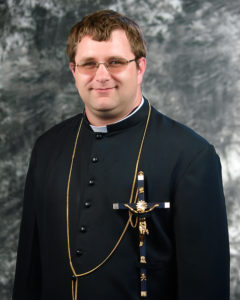
Fr. Matt Keller, C.PP.S., is the pastor of St. John the Baptist Church in Glandorf, Ohio.
Aug 4, 2023
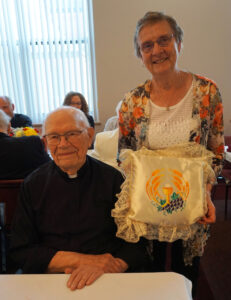 When Fr. Donald Thieman, C.PP.S., celebrated his 70th ordination anniversary at St. Charles Center on July 1, one of his special guests brought along a special object.
When Fr. Donald Thieman, C.PP.S., celebrated his 70th ordination anniversary at St. Charles Center on July 1, one of his special guests brought along a special object.
Marilyn Link came to the celebration with a satin pillow that she had carried when, as a five-year-old, she was part of the procession at Fr. Thieman’s first Mass.
Marilyn is the oldest of Fr. Thieman’s nieces. She and two of his young cousins, Sarah McDonough Baldorf and Mary Ann Penno Diller, were part of the procession into
Fr. Thieman’s home parish, Holy Trinity Church in Coldwater, Ohio, on June 7, 1953. After Mass, family and friends joined Fr. Thieman for a celebration meal at the Coldwater High School gym.
It was a big day, but a long day for a five-year-old. Marilyn’s long-sleeved white dress, which was flocked and flounced, was “hot and it smelled,” Marilyn said. “The veil hurt my head. And I could not run out and play” like the other children were free to do. Yet even at five, she realized something momentous was going on—and she was a part of it, along with her uncle.
A few years after his ordination, Fr. Thieman volunteered to minister in Chile, where he served for over 50 years. He returned to the U.S. in 2012 and lives at St. Charles.
Marilyn, now mature in her own faith and wisdom, is an active parishioner at Holy Trinity, where she wore that hot, itchy dress so many years ago. She served as a lector for 40 years, has taught several Bible studies, and is a server for funeral Masses.
She said she appreciates the example her uncle has set for the family through his 70 years as a Missionary of the Precious Blood. “Fr. Donald is dedicated to God and the people of God,” she said. “His nieces and nephews were always excited when he returned from Chile to visit with the family. We are happy that he is spending his retirement so close to home.”
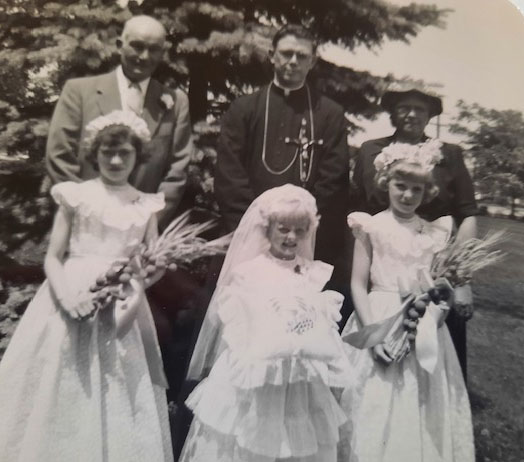
Aug 2, 2023
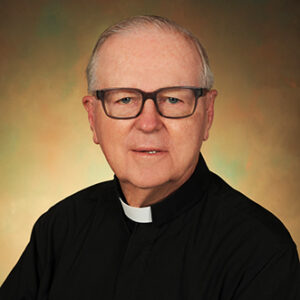 Fr. William Delaney, C.PP.S., died at 3 p.m. on Monday, July 31 at Mercy Retirement and Care Center, Oakland, Calif. He was 87.
Fr. William Delaney, C.PP.S., died at 3 p.m. on Monday, July 31 at Mercy Retirement and Care Center, Oakland, Calif. He was 87.
Fr. Delaney was born in Oakland on May 28, 1936, to William and Mary Margaret (Murphy) Delaney. Having met Precious Blood priests at his home parish, St. Barnabas, in Alameda, Calif., he joined the Congregation in 1956 at St. Charles Seminary in Carthagena, Ohio, and was ordained on June 8, 1963.
Fr. Delaney was active in parish and education ministries and in leadership during his 60 years as a priest.
After his ordination he served briefly at parishes in Oklahoma then at St. Anthony Church in Detroit; and St. Barnabas in Alameda.
In 1964, he was appointed an instructor at Del Bufalo Seminary in Liberty, Mo., and in 1965 became a member of the Kansas City Province, then the Province of the Pacific. He was appointed head of the religious education department at Cardinal Newman High School in Santa Rosa, Calif., and later served as the faculty house superior and the principal.
Fr. Delaney served as provincial secretary from 1970–74.
For many summers, Fr. Delaney studied at the Institute of Pastoral Studies at Loyola University in Chicago. In 1970, he received a master of religious education degree.
From 1977–90, Fr. Delaney was the associate pastor then pastor of St. Anthony Church in Manteca, Calif. He also served two terms on the provincial council.
Fr. Delaney also ministered at St. Agnes Parish, Los Angeles, as pastor (1990-2001), and St. Aloysius Gonzaga, Los Angeles, beginning in 2001. He returned to St. Agnes as senior pastor in 2005, accepting the position of pastor pro tem in 2014.
In 2015, Fr. Delaney retired to Sonnino Mission House in Berkeley, Calif. He moved to Mercy Retirement and Care Center in 2017.
Survivors include his sisters, who both belong to the Sisters of the Holy Names of Jesus and Mary, Sr. Maureen Delaney, SNJM, of Portland, Ore., and Sr. Rosemary Delaney, SNJM, of Oakland.
Fr. Delaney’s lifelong commitment to social justice and to the poor began at home, where he witnessed his father’s tireless work with the St. Vincent de Paul Society. In turn, Fr. Delaney inspired countless others in the parishes where he served and in his religious community. Fr. Delaney understood that a good shepherd not only cares for those who are in his parish but also leads them out into the world to make a difference in the neighborhood where they live.
He was in his 40s and assigned to St. Anthony in Manteca when he learned Spanish, so he could better serve the multicultural community there. The parish included people from many walks of life and ethnic backgrounds, and Fr. Delaney was able to bring them together and see each other as brothers and sisters in Christ. The spirit of the Gospel of justice and peace guided his ministry and leaves a legacy of hope in the people and the places where he has served.
That includes the Mercy Retirement and Care Center, where he spent his last years. While there, he was in ministry, to the staff, many of whom were Spanish speakers, and to other residents. He regularly led the rosary, including Precious Blood prayers. He went to all the activities and made himself a part of the community there. To the end of his life, it was important to him to minister to the people of God.
A Mass of Christian Burial was celebrated on Friday, August 11 at 10 a.m. at the Holy Spirit Chapel of the Sisters of the Holy Names of Jesus and Mary Center, 65 W. Rincón Ave, Campbell, Calif. Fr. Joseph Nassal, C.PP.S., presiding.
Burial took place at Holy Sepulchre Cemetery and Mortuary, 26320 Mission Blvd, Hayward, Calif.
May he rest in peace.
Memorial donations may be made to the Missionaries of the Precious Blood, United States Province.
![]()


 Fr. James McCabe, C.PP.S., 91, died peacefully in his sleep on Sunday morning, August 27, in the infirmary of St. Charles Center, Carthagena, Ohio. He had been in failing health.
Fr. James McCabe, C.PP.S., 91, died peacefully in his sleep on Sunday morning, August 27, in the infirmary of St. Charles Center, Carthagena, Ohio. He had been in failing health.




 When Fr. Donald Thieman, C.PP.S., celebrated his
When Fr. Donald Thieman, C.PP.S., celebrated his 
 Fr. William Delaney, C.PP.S., died at 3 p.m. on Monday, July 31 at Mercy Retirement and Care Center, Oakland, Calif. He was 87.
Fr. William Delaney, C.PP.S., died at 3 p.m. on Monday, July 31 at Mercy Retirement and Care Center, Oakland, Calif. He was 87.